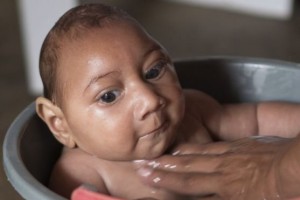After the deadly Ebola pandemics Zika virus (ZIKV) is yet another disease borne out of the African soil and spreading across the world right now. It’s named after the Zika forest in Uganda where it originated.
An outbreak of Zika virus a flavivirus transmitted by Aedes mosquitoes, was identified in Northeast Brazil in the early 2015. . This was an area where Dengue virus was also circulating. By September reports of an increase in the number of infants born with microcephaly in Zika affected areas began to emerge and Zika virus was identified in the amniotic fluid of two women whose fetuses had been found to have microcephaly by prenatal ultrasound. 35 infants with microcephaly were born during August – October 2015 in Brazil . That was the beginning stage of this Zika virus.
Subsequently it spread to other countries in South America ,Central America and the Caribbean. Presently 19 countries outside Brazil have declared that there is Zika Virus outbreak in their areas.
The virus is spreading fast in the Americas. But so far no case has been reported in India . However the widespread presence of Aedes mosquitoes in the country offers fertile ground for the virus to breed and spread. We need to be all more cautious.
How the infection spreads
It is spread to people through mosquito bites (infected Aedes mosquito) .It can also be passed on from mother to child, blood transfusion and sex also.
Symptoms
Infection with zika virus results in a minor illness known as Zika fever which causes symptoms such as fever , rashes on skin, joint pain, red eyes etc.
In Zika infected pregnant women the children are born with microcephaly. Microcephaly is a congenital condition where child is born with a smaller than normal sized head and impaired brain development ; It can cause motor and learning difficulties, among other problems. The condition can also be caused by genetic factors or drug or alcohol abuse during pregnancy. It is not a disease itself . It’s a condition caused by the failure of a fetus’s brain to develop in the mother’s womb.
It usually remains in the blood of an infected person for
only a few days to a week. However it lasts no more than a week and is usually
milder than dengue
. One main reason Zika is troubling is because it
has been linked with birth defects.
Treatment
No vaccine and no treatment is available as on date.
Get plenty of rest.
Drink liquids more and more to prevent dehydration.
Take medicines to reduce fever.
Prevention
WHO recommendations for zika virus prevention include :
-prevent mosquito breeding in water near homes .
- Empty ,clean or cover containers that can hold water such as buckets, flower pots or tyres so that places where mosquitoes can breed are removed.
-Spraying of insecticides during outbreak recommended.
-People travelling to high risk areas should avoid the trip or take precautions including use of repellents when outside.
-Use mosquito net when indoor.
- Pregnant women should always protect themselves from mosquito bites by using nets when indoors , wearing long sleeves and pants ,using approved insect repellents when outdoors.
Note – Zika virus (ZIKV) is not fatal but may pose a risk to pregnant women’s fetus.
If you have recently traveled and have some symptoms as above , tell your health care provider as to where you have traveled. Travelers having febrile illness within two weeks of return from an affected country should report to the nearest health facility.
-Dr. Suman Setia BAMS, DNHE , PGDHHM
Also see: Diet in Dengue Fever
